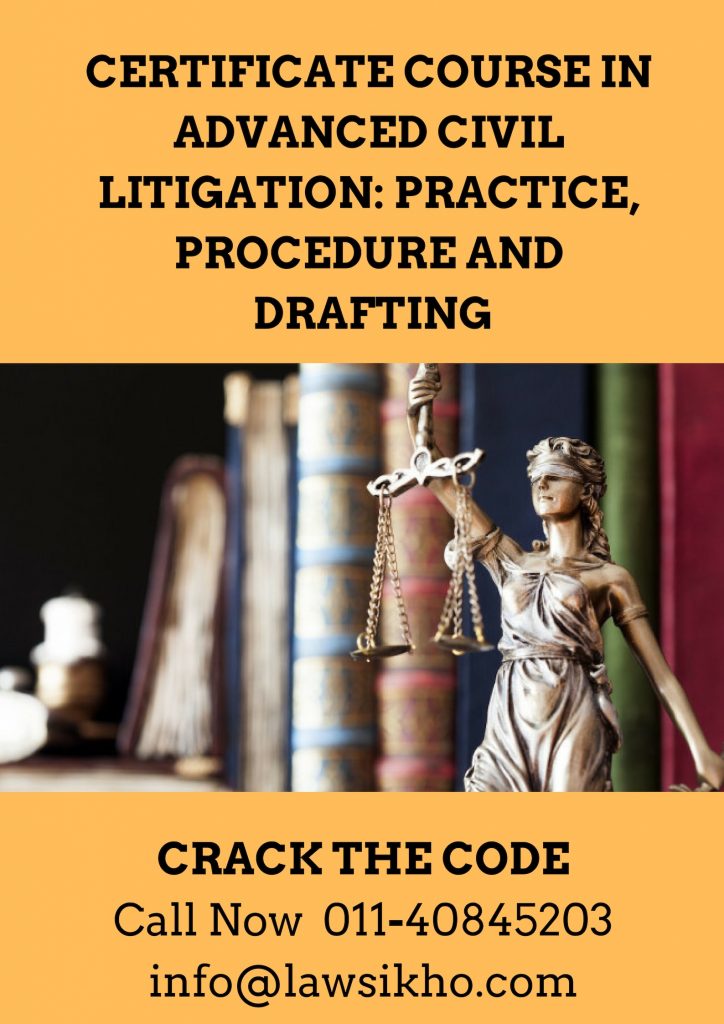This Article is written by Parshav Gandhi, a 3rd-year student, Indore Institute of Law. This article mainly discusses the categories of the persons who can sue and who cannot be sued.

Introduction
In the concept of a tort, usually a person who suffers injury has a right to file a case against the person who caused him harm, but there are certain categories of people who cannot sue a person for their loss and also there are some people who cannot be sued by any person.
So, the question arises why these categories of people are restricted from filing a case and also why do certain people are protected from such suits.
Who can/can not Sue?
Who can sue?
Any rational person including businessman, organisation, government and other individuals can sue, provided that, they are of sound mind and are not disqualified by law.
Who cannot sue?
There are seven categories of persons cannot sue, only subject to certain limitations:
- An Alien enemy
- Convict
- Bankrupt
- Husband and wife
- Corporation
- An Infant/Minor
- A foreign state
An Alien Enemy
An Alien enemy is the person of enemy nationality or residing in the enemy territory. Such a person doesn’t have the right to sue for tort.
According to English law, the person cannot maintain the right of sue unless allowed by order in council.
According to Indian law, the person cannot maintain the right to sue unless obtains the permission of the central government under section 83 of the civil procedure code is obtained.
Illustration
If A is a resident/citizen of an enemy country and wants to sue B, a resident of India, he cannot do that unless he obtains the permission of the central government.
Convict
A convict is a person against whom a judgement of death or imprisonment has been pronounced by the court of law.
According to English law, the person whose sentence is unexpired does not have the right to sue for any damages to his property or for recovery. But this concept was removed by criminal justice act, 1948.
In India, until 1921, in the offence of forfeiture of the property, the offender is disabled from right to sue for any injury. But today, a convict in India may sue for torts, both to his property and his body.
Illustration
Situation 1: Before 1921, if A is a convict and want to sue B for injury regarding the property, in that situation he cannot sue the person in the offence of forfeiture of the property.
Situation 2: After the 1921 changes in IPC, if A is a convict and want to sue B for injury regarding property or body, he gets the right to sue for both injury to property as well as to the body.
Bankrupt
A bankrupt is also under the disability to sue for the act against his property.
According to the Indian law, All his property is vested in possession of bank or official assignee and in English law all property is vested to the trustee. All the offences against the property, the right to action is vested with the trustee or the assignee. But in the case of personal wrong, the person has a right to sue.
In the situation, where a tort causes injury to both the person and the property, so the right of action will split between the two.
Illustration
Situation 1: If A is a bankrupt and his property is vested in the possession of official assignee i.e. C by the bank. If B trespasses his property, the right of action is vested on official assignee i.e. C.
Situation 2: But if B trespasses A’s body then in that situation the right of action is vested on A.
Husband and wife
Back in times, in English law, the husband and wife cannot sue. By the virtue of the married women’s property act, 1882, a wife can sue her husband. But the husband cannot sue his wife. A wife could not sue her husband for the antenuptial tort or personal wrong.
The law reform (husband and wife) act 1962 made a drastic change and allowed both to sue.
In India, both the spouses have the right to sue in any offences.
Corporation
A corporation does not have right to sue for the personal injury as because of its nature it is clear, that a corporation cannot be injured personally but a corporation can sue for the tort affecting its property.
The qualification is:
- The tort must not be impossible in nature.
- In the case of defamation, the corporation can sue the other person if, it can prove that the injury has the tendency to cause actual damages.
- A corporation may sue for a libel or any other wrong affecting its property or business.
In this case, it was held that a corporation has a right to sue, not only for the property but also for its personal reputation.
An Infant/Minor
A minor can sue for the tort committed against him, subject to that by his next friend or guardian. But he cannot maintain a remedy for the injury sustained when he was in his mother’s womb.
In Walker v. Great Northern Railways
In this case, a pregnant woman injured due to a train accident, as a result of which her child was born deformed. The Court held that the minor cannot maintain a remedy for the injury sustained when he was in his mother womb.
But in a case having similar facts, the supreme court of Canada provided the remedy to the infant.
A foreign State
In England, a foreign state cannot be sued in any court unless the action is recognised by her majesty.
In India under section 84 of the civil procedure code, a foreign state can have the right to sue provided that such state has been recognised by the central government.
Who can/cannot be sued?
Who can be sued?
Any rational person like a businessman, an organisation can be sued for the act committed by them or their servant in the course of employment.
Who cannot be sued?
- The Government
- Foreign sovereign’
- Ambassadors
- Public Official
- Infants/Minor
- Lunatic
- The Corporation
- Trade Union
- Married Woman
The Government
Under Article 361 of Indian Constitution, the president, Governor, Rajpramukhas of the state are not answerable to the court:
- For exercise and performance of the power and duties of their office.
- For any act done by them in the exercise of their power and duties.
Five rules regarding the liability of the government
- The government is liable for the act done by its servant in the course of transaction in which a private person is engaged.
In Secretary of state of India v. Shivranji
2. The government is liable for the loss caused by the improper interference of the forest officer in the removal of the timber by the plaintiff who had purchased a forest.
3. The government cannot be sued in respect of the act done by the servant in the exercise of its sovereign powers. Like, act done at the time of war, use of land to practice bombing, act done during riots etc.
Illustration
If A, a policeman, during the riots gives the order of lathi charge. In that process, Z got injured and sued A. Here A is not liable as he is acting under sovereign power.
4. Liable to restore the property or money wrongfully obtained by its servant on its behalf.

Illustration
If A, a government servant restores B’s property wrongfully on behalf of the government. Here the government is liable to restore the property.
5. The government is not liable if the act is done by its servant in the course of his duty unless expressly authorised to him.
In kastorilal v. state of U.P.
In this case, the policeman detains the gold of the petitioner. The gold is misplaced from the custody of the police. The plaintiff filed the case against the government as the policemen are the servant of government of India. Here the court stated that the government is not liable for the act done by its servant in the course of his duty unless expressly authorised to him.
If a tortious act committed by the servant there are two situations relating to the liability of the government:
- The action for the damages for the loss cannot arise if the servant did the act under the sovereign power of the state.
- But, if committed in discharge his duty assigns to him, not by the virtue of the delegation of sovereign power, there arises the action for damages.
A military driver of the school of Artillery, once assigned a task to transport the machine, hit B, as a result, B died. Here the government is liable as the work is assigned to him and the act committed during the discharge of the duty.
Foreign sovereign
A foreign Sovereign cannot be sued unless they themselves submit to the jurisdiction to the local government.
By residing in a foreign country, one does not waive his right to the jurisdiction from the local government.
Under the civil procedure code, a foreign sovereign can be sued in the Indian court only with the consent of the central government.
The conditions under which the Central Government gives permission:-
- If the foreign sovereign has instituted a suit in the court against the applicant.
- If the foreign sovereign, by himself or by agent, trades within the local limits of the Indian court.
- If the foreign sovereign’s immovable property, in respect of which the applicant wants to sue, is situated in India.
As per provisions of Ss. 86 and 87 of CPC, a suit against a foreign sovereign without the consent of the Central Government is only permissible where the plaintiff is a tenant under the foreign sovereign and the suit relates to lands held by him.
Otherwise, the permission of the Central Government is mandatory, and when permission has been applied for and refused by the Government, it is not open to the court to question the propriety of the order refusing consent.
Illustration
A wants to sue B, a foreign sovereign. He can sue only by taking permission from the central government.
Ambassadors
Foreign ambassadors, their family, servants also, cannot be sued, unless they waived their privilege by submitting to the jurisdiction of the court. An ambassador cannot be sued during his term of office.
Foreign ambassadors can be sued in the Indian court only with the consent of the central government.
In Harbhajan Singh Dhalla v Union of India
The petitioner, in this case, carried out building maintenance, reconditioning and renovations at the Algerian Embassy and the residence of the Algerian Ambassador in New Delhi. He tried to collect his dues but failed and then requested the Ministry of External Affairs to grant the permission to sue the Algerian Embassy. The Ministry refused to grant the permission on “political grounds” and also contended that under section 86 petitioner failed to make the prima facie case. And if permission has been applied for and refused by the Government, it is not open to the court to question the propriety of the order refusing consent.
Public Official
No action lies against the public official in their official capacity with respect to torts committed by them. But, they can be sued for the act committed by them in their private capacity.
If the act by the servant of the government is done under sovereign power no action lies against the government.
In this case, the train collides with the taxi. For these, Bhagwati prasad files a case against the U.O.I, of negligence. It was held that a suit for the damages can be filed against the act of the official in their private capacity but not for the act done under sovereign power.
Infants/Minor
The infant/ minor can be sued for the act committed by them as an adult. Thus a minor can be sued for assault, false imprisonment, libel, slander, fraud etc. but where intention, knowledge or some other condition of mind are essential ingredients of liability then in that cases minor/ infant can be exempted due to their mental incapacity.
In Walmsey v. Humonick (1954 2 D.L.R. 232)
Two little boys were playing cowboy related games. One boy hit the arrow and it hit another boy in his eye. The court gives the judgement in defendant’s favour as a five-year child doesn’t even think about it. Hence the defendant is not liable.
Lunatic
There are two conditions related to lunatic:
- If the act was done by a lunatic, when he is not in the condition of a stable mind, in that condition the lunatic cannot be sued.
Illustration
If A commits battery against B when he is not in a condition of stable mind. He cannot be sued.
2. But, if the act was done by a lunatic when he is in the condition of a stable mind, he can be sued.
Illustration
If A has a disease where he becomes lunatic for some period but, becomes a normal person after some time. If he commits battery against B when he is normal. In that situation A can be sued.
Corporation
A corporation cannot be sued, unless
- The act done was within the scope of agent employed by the corporation
- The act done was within the purpose of the incorporation.
In Poulton v. London and S.W. Rly. Company (1867 L.R.2 Q.B. 534)
The railway master was employed by the defendant company, arrested a man for not paying the freight charges of the horse he is carrying with him. The petitioner filed a case against the corporation. It was held that the railway master was employed to arrest the person only if the person does not pay the freight of himself. No order was given to him to arrest a person if he is not paying the freight charges for the goods carried by him. Here, he is acting in his private capacity so a corporation cannot be held liable, only the station master can be held liable
Trade Union
In India, under the Indian Trade Union Act, 1926, a registered trade union cannot be sued. But the changes in the Act in 1939, now a trade union can be sued in its registered name.
Illustration
If one of the members of a trade union named XYZ commits a tort then:
Situation 1: As per the Trade union act, 1926, XYZ cannot be sued
Situation 2: After changes in 1939, XYZ can be sued.
Conclusion
A person who suffers injury has the right to file a case against the person who caused him harm, but there are certain categories of people who cannot sue a person for their loss and also there are some people who cannot be sued by any person, like foreign ambassadors, public officials, infants, sovereigns, alien enemy. But there are certain limitations where these categories of people can sue and can be sued, subject to the permission of the central government and unless they themselves waived their privilege by submitting to the jurisdiction of the court.
 Serato DJ Crack 2025Serato DJ PRO Crack
Serato DJ Crack 2025Serato DJ PRO Crack









 Allow notifications
Allow notifications


